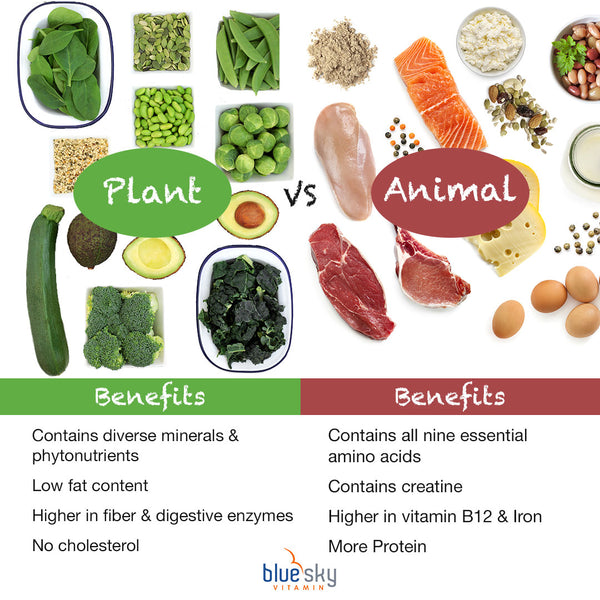On orders over $30!

Plant vs Animal Protein: Which is Better for You?
Your body needs protein to create, repair and sustain its critical structures but where should you get it from? With a wide range of protein powders and supplements on the market, it can be difficult to know which products are right for you.
Firstly, you may be deciding between animal or plant protein depending on your diet. If you’re following a vegan or vegetarian diet, you’ll certainly want to opt for plant protein, which can be found in a range of foods, including tofu, chickpeas, and lentils. For carnivores, red meat and poultry are good sources of protein, as are dairy and egg products.
What’s the difference?
Clearly, the source of animal and plant protein differs but there’s more to it than that. To function effectively, the body requires a number of different amino acids. Many foods that contain protein also include these essential amino acids. However, not every protein source also provides you with the amino acids you need.
Without the right mix of amino acids, your body won’t be able to use protein optimally. This means you’ll be missing out on the full impact of increasing the amount of protein in your diet.
Complete protein sources are those that contain all nine of the essential amino acids. Essentially, when you consume a complete protein source, you’re also consuming the full range of amino acids your body needs. The most common complete protein sources include
- Red meat
- Cheese
- Whey
- Milk
- Eggs
- Chicken
- Turkey
As you can see, these are products that are animal based, as opposed to plant proteins. Some people maintain that this makes animal proteins a better option, but this isn’t necessarily the case.
While most sources of plant protein don’t contain the full range of amino acids your body needs, some do. Buckwheat and quinoa are complete sources of plant protein, for example. However, if you’re getting all or most of your protein from a plant based diet, you will need to ensure that you’re getting an adequate intake of the essential amino acids too.
Fortunately, many products on the market, such as protein powder, are supplemented with amino acids or use a mix of protein sources that complement each other’s amino acid profile. This means that some powder and protein products are enhanced with additional amino acids. By complementing your dietary protein intake with amino acid supplemented protein powder, you can ensure your body is getting an adequate amount of protein and the full range of amino acids.
What’s more, the availability of amino acid supplemented plant protein powder and products means you needn’t worry about most natural sources of plant protein being classed as incomplete.
Comparison, Benefits and Drawbacks
When choosing between animal and plant protein, one isn’t necessarily better than the other. If you’re increasing your protein intake because you want to build or retain muscle, animal protein may be more convenient. However, many people are of the opinion that animal protein is better for muscle gain because it is a complete source of protein. While this is true, if you ensure that you are getting all the essential amino acids included in each protein meal or shake you won’t be missing out on much.
Of course, protein isn’t the only nutrient you need to consider. Many sources of plant protein also contain phytonutrients, which simply aren’t present in animal products. As phytonutrients are exclusive to plants, you will only benefit from them if you consume plant protein. Similarly, plant based foods contain much-needed fiber, which you won’t get from animal products.
Conversely, animal protein is typically higher in creatine (which has been shown to be a potent muscle builder and performance enhancer), vitamin B12 and iron. While some sources of plant protein do contain some of these nutrients, they tend to be in fairly low amounts. Due to this, people following a plant based diets are often advised to supplement their B12 and iron intake.

Is animal or plant protein right for you?
It’s clear that there are advantages associated with both animal and plant proteins but there are drawbacks with each option too. If you’re not following a restrictive diet, you may find that the most effective protein source for you is a mix of animal and plant proteins. This will enable you to get the benefits associated with each protein source while minimizing the negative impact each source can have.
References:
https://www.medicalnewstoday.com/#which-is-better-for-health
https://www.self.com/story/plant-vs-animal-protein

Leave a comment